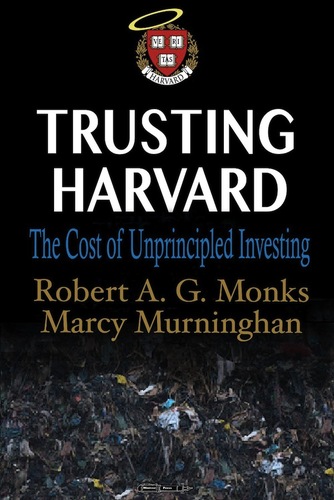
Trusting Harvard: The Cost of Unprincipled Investing
By Robert A.G. Monks and Marcy Murninghan
For decades, Robert Monks has promoted a simple idea: that property owners—even if the property is a share of corporate equity, or pile of funds to invest—have a civic moral responsibility for their holdings. At minimum, their obligation is to assure that no laws have been broken, no damage to others inflicted. More broadly, property owners have an obligation for active engagement, to assure positive performance and ethical integrity. That’s a form of citizenship that’s good for democracy, as well as capital markets. And it views “capital” holistically, connecting the stock and flow of financial, environmental, social, human, and other forms of capital because that’s how the real economy works.
These concepts of “stewardship”, “ethics”, “capital”, and “citizenship” are the pillars undergirding Trusting Harvard. In it, on the occasion of his 80th birthday and upcoming 60th Harvard reunion, Monks once again makes his argument to a Harvard President. Along with co-author Marcy Murninghan, he provides a framework for answering two questions: How can Harvard fulfill its fiduciary obligation as an investor in ways that advance its beliefs, values and commitments? How can Harvard take the lead in creating a curriculum for students, professionals, and the general public about the civic moral obligations of wealth? While aimed at Harvard, the issues covered are relevant to other universities and tax-exempt institutional investors, because they have a special duty to advance the public interest. In addition to fiduciary and curricular frameworks—the “myopic”, “ethical”, and “integrated” fiduciary; a tiered approach to gaining fiduciary knowledge and competence—a series of questions for trustees to ask are included. The result is a call to action to restore the social compact affecting universities and other public fiduciaries. That means moving away from a “house divided”, wherein fiduciary and program responsibilities reside in separate wings, to one wherein they are inextricably linked. And that’s good for everybody.
Pioneering shareholder activist and corporate governance adviser, Robert AG Monks, has written widely about shareholder rights & responsibility, government capture, corporate impact on society and global corporate issues.
He is the author of Corporate Governance (with Nell Minow), Power & Accountability (with Nell Minow), Watching the Watchers, The New Global Investors, The Emperor’s Nightingale, Corpocracy and Corporate Valuation (with Alexandra Lajoux).
Mr. Monks is an expert on retirement and pension plans and was appointed director of the United States Synthetic Fuels Corporation by President Reagan, who also appointed him one of the founding Trustees of the Federal Employees’ Retirement System. Mr. Monks served in the Department of Labor as Administrator of the Office of Pension and Welfare Benefit Programs having jurisdiction over the entire U.S. pension system.
Mr. Monks was a founder of Institutional Shareholder Services (ISS), now the leading corporate governance consulting firm. He also founded Lens Governance Advisers and co-founded GMIRatings (formerly The Corporate Library). He is a shareholder in and advisor to Trucost, the environmental research company.
Since 1983 Marcy Murninghan has worked on the integration of civic moral values into corporate and capital decision making, as a scholar, author, educator, and entrepreneur. Currently, she is developing a model for greater investor accountability, via digital tools, to local, regional, national, and international priorities via a Civic Stewardship League, aimed at tax-exempt institutional investors. She is co-founder and editor of The Murninghan Post and founding president of The Lighthouse Investment Group (1987), which provides consultation and analysis on values-based fiduciary duty, stewardship, and corporate responsibility issues.